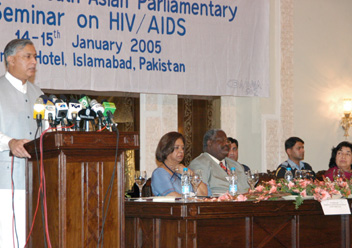
Islamabad, Pakistan, 14-15 January 2005
Sub-Regional Parliamentary Seminar on HIV/AIDS in South Asia
- Recognizing the potential risk of HIV/AIDS pandemic in South Asia and its effect on economic and social development.
- Recalling and re-affirming our commitment to achieving the internationally agreed development goals, including those contained in the 2000 United Nations Millennium Declaration (MDG) and in the outcomes of the major UN conferences and international agreements since 1992, including:
- UNGASS Declaration of Commitment on HIV/AIDS adopted by the Special Session of the UN General Assembly (June 2001)
- Program of Action of the International Conference on Population and Development (ICPD) (1994),
- Kathmandu Call Against HIV/AIDS in South Asia: Accelerating Actions and Results” agreed at the UNAIDS/UNICEF High-Level HIV/AIDS Meeting (February 2003)
- Leadership Statement of the XV International AIDS Conference in Bangkok (July 2004).
- Acknowledging that the HIV/AIDS epidemic is not simply a public health problem: it is a development crisis which has social, economic, gender, cultural and political implications.
- Expressing with grave concern that there are an estimated 7.1 million1 people living with HIV/AIDS in South and South-East Asia and that women and girls are particularly vulnerable to HIV infection.
- Recognising that prevention must be the mainstay of the region’s response to the epidemic, and that unless prevention is urgently scaled up, by 2010 more people will be infected in Asia than in Africa.
- Recognising that implementation of these measures will have further benefit in preventing further spread of hepatitis and other major diseases in the region.
- Expressing concern that the significantly higher rates among high risk behaviour groups will ultimately move into the wider population.
- Regretting the fact that fewer than 6% of the people who needed anti-retroviral (ARV) treatment in Asia had access in 2004.
- Underlining the vital role of parliamentarians as peoples’ representatives at all levels in mobilizing public support, changing societal attitudes, reviewing HIV/AIDS policy and increasing financial support for HIV/AIDS programmes.
We, the participants of the Parliamentarians for Global Action (PGA) Sub-regional Seminar on HIV/AIDS in South Asia, held at the Serena-Islamabad Hotel, Islamabad, Pakistan, 14-15 January 2005, hereby agree to:
- Mobilize increased financial and human resources to strengthen primary health care systems and support large-scale HIV/AIDS prevention, care and treatment programmes;
- Adopt legislation which confronts stigma and discrimination against people living with HIV/AIDS;
- Increase the availability of male and female condoms given the disparity between the supply and demand for condoms;
- Encourage the implementation of integrated, rights-based HIV/AIDS programs that include scaled-up prevention, care and treatment and measures to mitigate the impact of AIDS;
- Support closer linkages between HIV/AIDS services and reproductive health services;
- Support programmes which address the underlying factors increasing vulnerability to HIV, such as poverty, lack of education, human rights violations and gender inequality;
- Ensure that programmes prioritize the needs of women, young people and marginalised groups and include the participation of people living with HIV/AIDS and provide assistance in caring for orphans and children made vulnerable by AIDS deaths;
-
Ensure the effective utilization of existing resources by supporting the implementation of the “Three Ones”2 principles as articulated by UNAIDS and its partners;
-
Foster support for the implementation of the WHO/UNAIDS “3 by 5” Initiative3 to provide ARV therapy to 3 million people with HIV/AIDS in developing countries by the end of 2005;
- Lead and facilitate open discussion of HIV/AIDS in our communities, constituencies and the media in order to raise public awareness and oppose the discrimination and stigma facing people living with HIV/AIDS;
- Promote strong leadership and generate increased political will at all levels to address the underlying causes of HIV/AIDS and scale up effective multi-sectoral responses to meet the HIV/AIDS challenge in South Asia;
- Exercise scrutiny over the actions of our Governments in order to attain the targets agreed in the international commitments and agreements;
- Improve the reliability of the data of HIV/AIDS prevalence and incidence;
- Advocate the removal of legal obstacles to encourage the production and distribution of safe and regulated generic drugs with quality control to international standards and to make them affordable in South Asia;
- Call upon the WTO to ensure that health needs are put before profits;
- Establish safe blood banks and the voluntary donation of blood and voluntary counselling and testing centres;
- Encourage our governments to strengthen both south-south and north-south collaboration and devote more resources in the development of HIV vaccines and female controlled methods such as microbicides and better ARV drugs;
- Ensure safety and protection of the lives of the persons undergoing clinical trials;
- Strengthen cooperation and networking with other Members of Parliament and other elected representatives and encourage cross-border collaboration and exchanges of information;
- Create focused groups within our respective parliaments which will raise awareness of HIV/AIDS in support of national responses;
- Form partnerships with other parliamentarians, UN agencies, civil society, international and national financial institutions, donors and the private sector to meet the objectives of this declaration;
- Set up appropriate follow-up mechanisms to monitor the implementation of this Declaration of Action that will include regional and bilateral exchanges and follow-up workshops on particular topics pertaining to HIV/AIDS prevention, care and treatment.
Done on 15th January 2005 at Serena Islamabad Hotel, Islamabad, Pakistan



